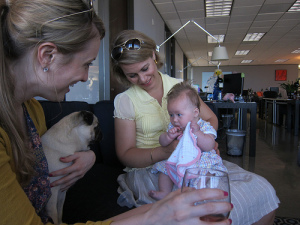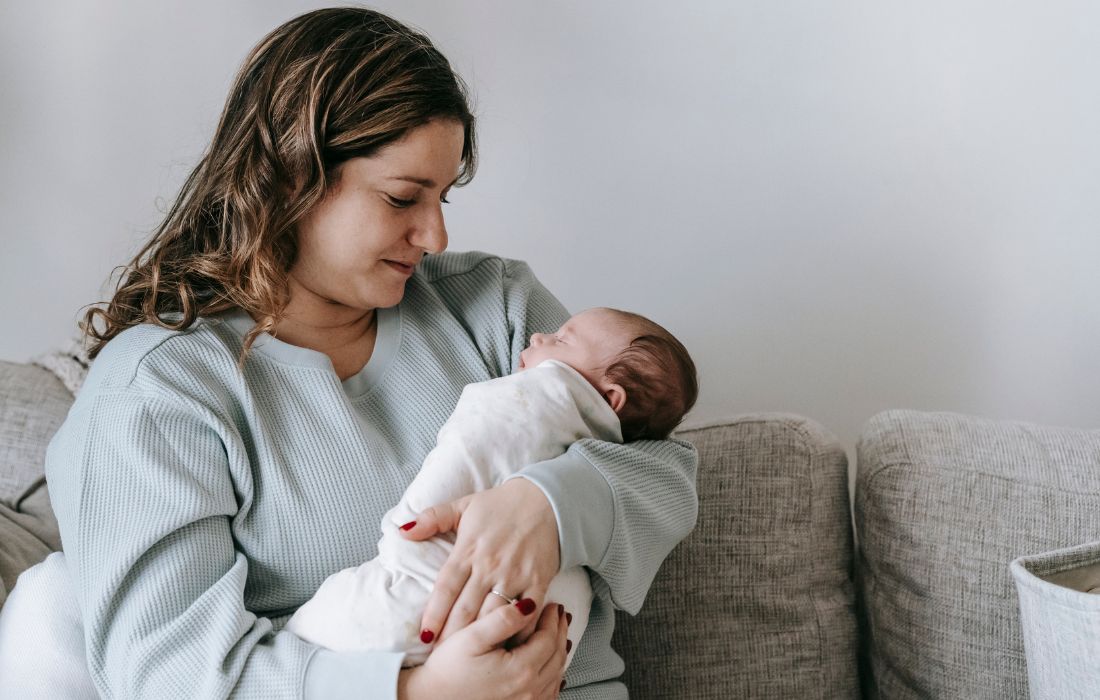 Our pets are often our first children, but when you bring a new baby home suddenly you have to make adjustments. Your dog (or cat)’s previously quiet home will be filled with new smells, sounds, along with some major changes in schedules. Your dog’s daily outings may be cut short, or he may be relegated to the back yard more often than he’s used to for potty breaks. If you have a cat, you may find that her nose is slightly out of joint with being woken during the night, or removed from her “spot” temporarily.
Our pets are often our first children, but when you bring a new baby home suddenly you have to make adjustments. Your dog (or cat)’s previously quiet home will be filled with new smells, sounds, along with some major changes in schedules. Your dog’s daily outings may be cut short, or he may be relegated to the back yard more often than he’s used to for potty breaks. If you have a cat, you may find that her nose is slightly out of joint with being woken during the night, or removed from her “spot” temporarily.
I have a wonderful dog named Cooper, whom I could not imagine displacing for a baby, which is why I wanted to talk a bit about creating as harmonious of an environment for your pet and your baby as possible. Luckily, there are plenty of things you can do to help make the transition as smooth as possible both for your fur baby and your newborn:
Practice Makes Perfect
You will know your baby’s approximate arrival date well ahead of time, so use this time to begin to acclimate your pet. Set up your nursery, let your dog sniff your baby’s clothes, and help him get used to new boundaries. If your pet will not be allowed on the bed once baby arrives, or will not be allowed in baby’s room, start this practice before you bring your baby home. Months before if necessary.
You may even want to go so far as to take your dog on a few walks with baby’s stroller so that it’s not uncomfortable when baby arrives and you want to get some fresh air in those early weeks (and I completely understand if a walk is the last thing you want to do).
Establish a “New” Routine
Bringing baby home can throw even the most loving pet owner for a loop. Your baby is suddenly the center of attention. Sure, you were able to take a 5:00 p.m. stroll every night before baby, and you fed the cat at exactly 6:00 a.m. and 6:00 p.m. every single day.
Once you bring baby home, this may all change. Be prepared for this. Instead of a walk every day at 5:00 p.m., gradually shift to a more flexible schedule. The same applies to feeding. Shoot for “around” certain times, as you may be attending to your new baby during a time when you were solely focused on your pet.
Focus On Your Pet
This is a big change for everyone, and unlike you, your pet isn’t able to voice frustrations through words. You may notice that your pet starts to act out as baby’s arrival comes closer, or shortly after you and baby come home from the hospital. Be prepared for this, and try to spend some time with just your pet both before and after baby comes.
Snuggle your cat on the couch, take your dog out for a long walk, play fetch, and just enjoy one-on-one time. It will be awhile before you can solely focus on your pet once your baby comes home.
Set the Tone
 Remember that animals are very intuitive, so if you’re nervous, your dog or cat will be nervous as well. Wait to introduce your baby until you are calm, because your pet is probably just as nervous as you are, if not more. They don’t understand who this little human is, and why it’s all of a sudden absconded mom and dad.
Remember that animals are very intuitive, so if you’re nervous, your dog or cat will be nervous as well. Wait to introduce your baby until you are calm, because your pet is probably just as nervous as you are, if not more. They don’t understand who this little human is, and why it’s all of a sudden absconded mom and dad.
Bring Home Baby’s Scent BEFORE Baby
Have dad or another trusted caregiver bring home a receiving blanket, burp cloth, or even a onesie so that you can introduce your pet to your new baby before you bring them home.
Remain in Control
When you are ready to introduce your baby to your dog or cat, make sure that you maintain control of the situation. You must be in charge. If that means that you run your dog around the neighborhood, and make sure the cat is fed, so be it. You want the introduction to go as smoothly as possible.
Reward Good Behavior
Praise your pet for following the new rules, and as your baby gets older, teach him how to behave around your family pet. Talk to your baby and your dog, so that they both feel included.
Once you’re up for it, consider taking both your dog and your new baby on a walk around the neighborhood.
Always Supervise
Regardless of how trustworthy your child or your pet is, you should always supervise any interaction between your child and your dog or cat. Even if you have set clear boundaries and enforced positive behavior, you can never be too careful. Babies make lots of noises that could easily agitate a pet, especially during the first few months home, so make sure that you are right there to soothe your pet or remove your child if you notice any skiddish behavior or agitation.
Pets and babies are both wonderful, and can be wonderful together so long as you are smart about their interaction.
To read more about how to introduce your pets to your new baby, check out these articles:
Introduce Your Dog to Baby
Preparing For Baby
photo credit: Lars Plougmann via photopin cc



